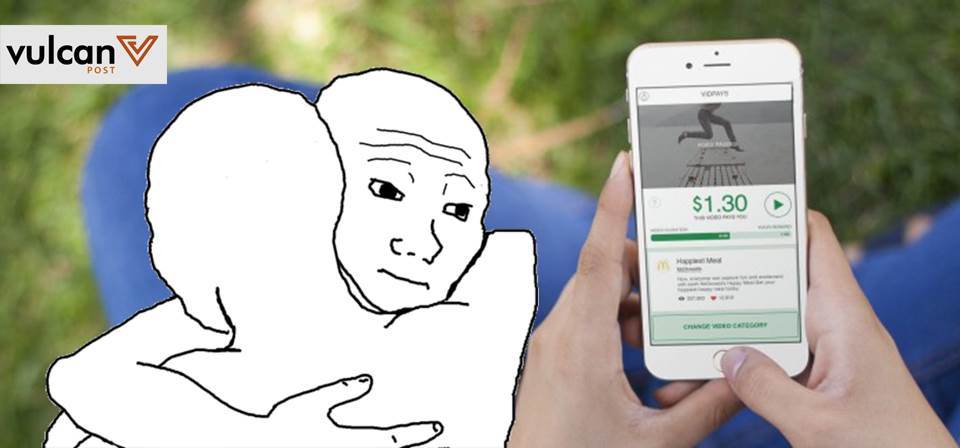Few months ago, we wrote about VidPays, an incentive-based advertising platform founded with the goal to solve the problem of advertiser-user communication. In a simple and hassle-free way, users watch ad videos and get rewarded in cash. All you need is a smartphone to download the VidPays app.
However, recently the founder decided to take an unfortunate step of stepping down from this incentive based mobile advertising, after having spent ringgits of his personal money and six months of hardwork on VidPays.
“Many think there is a way to fix this and we thought we can do better. But after much deliberation, me and my buddy decided to take the unfortunate step of shutting down our startup. It is better to fail fast, than to have a slow death,” said VidPays CEO and co-founder, Peter Yee.
Inspiration can be found all around us, and it is not necessary to learn entrepreneur lesson from successful companies such as Airbnb or Uber. Immediately when we found out that VidPays decided to leave the startup scene, we reached out to learn about their current plans, but did not receive comment. Instead they replied us with a blog post.
Here are three things we can learn from VidPays in the form of a critical question, and how you can apply these lessons to your own startup.
1. Are you solving a real problem?
Although VidPays is targeted to solve a problem in video advertising industry, the startup was not solving a real problem, which the founder elaborated as Tier 1 problems, by citing a medium article written by Mitchell Harper, the founder of Capital H Labs in Sydney, Australia.
Thus for VidPays, it is not consider a Tier 1 problem—money is a problem, but it is not a Tier 1 problem.
Example of startup that solve Tier 1 problem would be Petsodia. The startup is solving most pet owners’ Tier 1 problem by linking pet sitters to pet owners for their four-legged friends while they are away so that guilt won’t be eating into their conscience during their holiday.
2. Are you doing real market testing?
In our previous interview with Peter, VidPays was tested out with a very small scale of users (100 people) to carry out the beta testing phase. The response was positive.
VidPays app was completed in less than a month. The team was able to set up meetings with different business owners and agencies. “Their response was meh, we continued moving forward and set up another 10 meetings, this time including VCs. It was brutal. Concurrently, we were hustling with getting up our users number,” Peter blogged.
It is human nature to share our ideas to friends and family around us and most of the time, people are actually pretty kind and enthusiastic about the idea, but then in reality, they wouldn’t pay money for it. They were not being dishonest, it just that the people you asked were nice enough to show support and encouragement to your dreams and vision. Also, usually people who sing praises for your idea would simply think that it might be beneficial for others instead of themselves.
“I find advertisements annoying, so I might not be the right person to be asked, but this will be a good idea for people who enjoy watching advertisements.”
What is the lesson you ask? Look for buyers, a real demand or people who would actually need it and are willing to pay for it as soon as possible. As Peter described, they found out that the people they were asking are not the one who are going to use the product.
3. Are you prepared to face your fear?
There is a saying that goes, “Do what you’re afraid of and the fear will disappear.” For Peter, it was not the case.
“Running a startup or business has nothing to do with my existing skills at all. Many times I have wondered if I can do it, if I am good enough to do it. I am supposed to sit behind the computer and do the stuff that I am good at. Every time I am doing something I don’t enjoy, I see myself as a victim. Why such a feeling? It is because of fear,” Peter described.
To a certain extent, a startup—or any startup, for that matter—has a certain chance and percentage of potential failure, no matter how good the idea or concept is. Stepping into the startup world should be an acknowledgement of that reality.
Peter was afraid, but he did it anyway, he faced the fear and he failed. And he was initially afraid of telling people of his failure for fear of being labelled, but now he rather has an open mind to see behind his failures and gain something instead of sorrow.
To sum it up, as Peter has learnt, there is no shame in failure. He still intends to do what he’s afraid of.
You can read the full blog post here.












